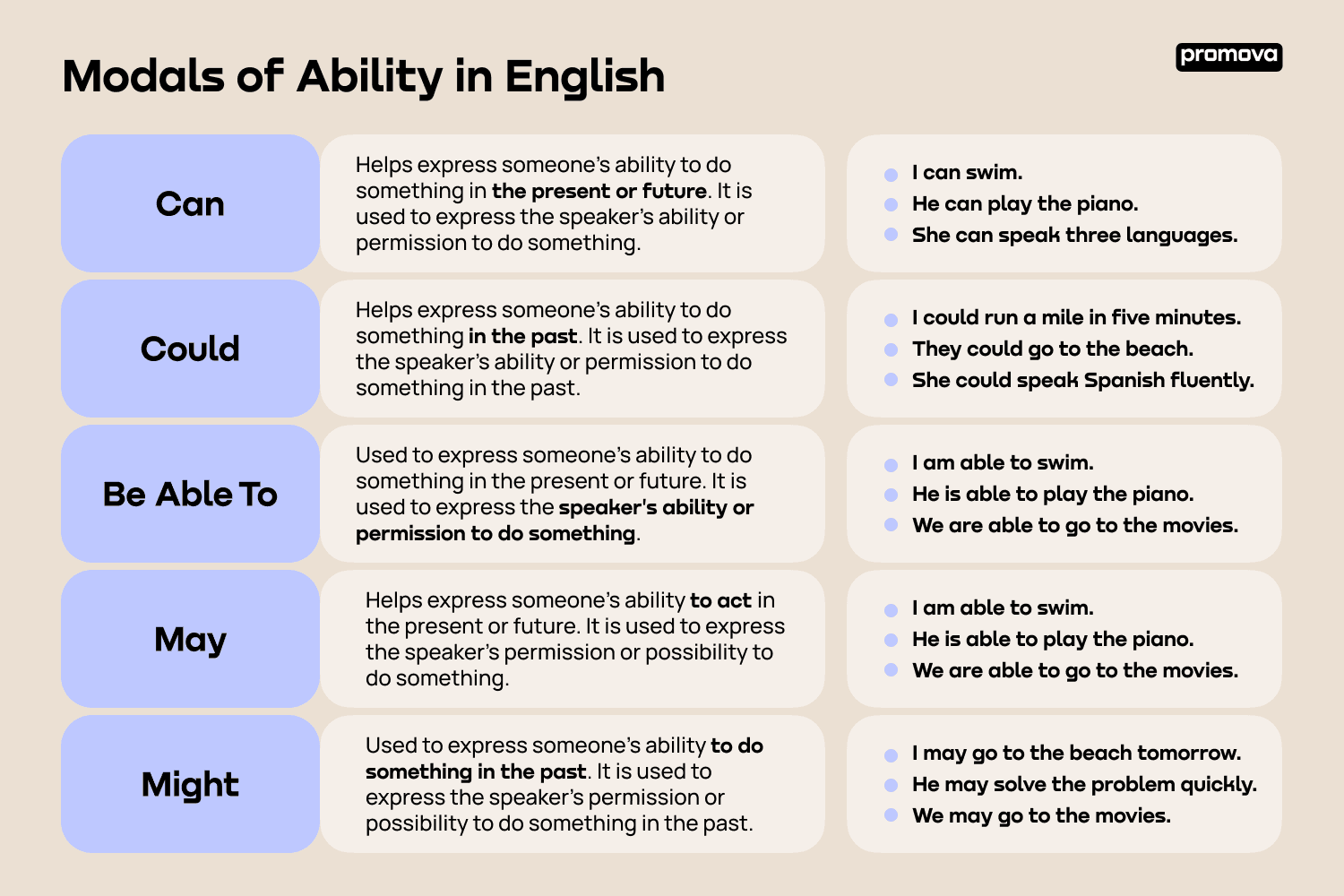Modals of Ability in English
Contents
Modal verbs are those verbs that express necessity, obligation, permission, or possibility. They are used to express ability in the English language.
In this reference, we will discuss what ability means and how to use it in English. We will also look at different modals of ability and examples of sentences with ability.
What Does Ability Mean?
Ability is the power to do something. It is the capability to act or to do something in a specific situation. It is the capacity to achieve something. It means acting on one's ideas, plans, and goals that make success achievable.
Ability is also the capacity to understand and respond to the environment. It is the capacity to recognize and respond to the needs of others.
Sentences with Ability in English
Ability can be expressed in a variety of ways in English. It can be expressed through verbs, adjectives, adverbs, and modal verbs. Some examples of sentences with ability in English are as follows:
- I can speak English fluently.
- He is able to read and write.
- She could solve the problem quickly.
- They may go to the beach tomorrow.
- We might be able to finish the project on time.
3
Modals of Ability
Modals of ability are used to express the power to do something or to act in a certain way. These modals are used to express someone's ability to do something.
The modals of ability in English are: can, could, be able to, may, and might.
Can
The modal verb "can" helps express someone's ability to do something in the present or future. It is used to express the speaker's ability or permission to do something.
Examples of sentences with the modal verb "can" are:
- I can swim.
- He can play the piano.
- She can speak three languages.
- We can go to the movies.
Could
The modal verb "could" helps express someone's ability to do something in the past. It is used to express the speaker's ability or permission to do something in the past.
Examples of sentences with the modal verb "could" are:
- I could run a mile in five minutes.
- He could solve the problem quickly.
- She could speak Spanish fluently.
- They could go to the beach.
Be Able To
The verb phrase "be able to" is used to express someone's ability to do something in the present or future. It is used to express the speaker's ability or permission to do something.
Examples of sentences with the verb phrase "be able to" are:
- I am able to swim.
- He is able to play the piano.
- She is able to speak three languages.
- We are able to go to the movies.
May
The modal verb "may" helps express someone's ability to act in the present or future. It is used to express the speaker's permission or possibility to do something.
Examples of sentences with the modal verb "may" are:
- I may go to the beach tomorrow.
- He may solve the problem quickly.
- She may speak Spanish fluently.
- We may go to the movies.
Might
The modal verb "might" is used to express someone's ability to do something in the past. It is used to express the speaker's permission or possibility to do something in the past.
Examples of sentences with the modal verb "might" are:
- I might have gone to the beach yesterday.
- He might have solved the problem quickly.
- She might have spoken Spanish fluently.
- We might have gone to the movies.

Creating Sentences With Ability
When creating sentences with ability verbs, use the correct form of the verb. For example, the verb "can" is used in the present, "could" is used in the past, and "may" or "might" are used to express permission or possibility.
When creating sentences with ability verbs, always use the correct tense. For example, the present tense is used to express the speaker's ability to do something in the present or future, and the past tense is used to express the speaker's ability to do something in the past.
In addition, apply the correct form of the verb when creating sentences with ability. For example, use the infinitive form when expressing the speaker's ability to do something in the present or future, and the past participle form of the verb is used when doing it in the past.
Summary
Modals of ability are used to express the power to do something or to act in a certain way. In other words, we use them to talk about our capacity to do something.
By studying and practicing ability verbs, one can learn how to use them correctly in different contexts. This will help one to become more confident when speaking English!



Comments